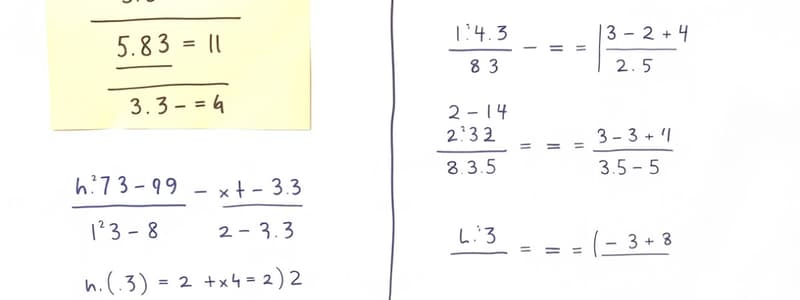Podcast
Questions and Answers
What is an example of a situation that represents a proportional relationship?
What is an example of a situation that represents a proportional relationship?
What is an example of a situation that represents a nonproportional relationship?
What is an example of a situation that represents a nonproportional relationship?
What equation represents the situation: 'Victoria charges $5 for each bracelet she makes'?
What equation represents the situation: 'Victoria charges $5 for each bracelet she makes'?
y = 5x
What equation represents the situation: 'Theatre tickets are $5 a person with a $10 service fee'?
What equation represents the situation: 'Theatre tickets are $5 a person with a $10 service fee'?
Signup and view all the answers
Define a proportional relationship.
Define a proportional relationship.
Signup and view all the answers
Define a nonproportional relationship.
Define a nonproportional relationship.
Signup and view all the answers
What is the constant of proportionality (CoP) in the equation y = kx?
What is the constant of proportionality (CoP) in the equation y = kx?
Signup and view all the answers
What is a linear equation?
What is a linear equation?
Signup and view all the answers
What is the constant of proportionality (CoP) in the equation y = -5x?
What is the constant of proportionality (CoP) in the equation y = -5x?
Signup and view all the answers
What type of relationship is represented by the equation y = 7x?
What type of relationship is represented by the equation y = 7x?
Signup and view all the answers
What type of relationship is represented by the equation y = 7x - 3?
What type of relationship is represented by the equation y = 7x - 3?
Signup and view all the answers
In a table, a relationship is proportional if?
In a table, a relationship is proportional if?
Signup and view all the answers
In a table, a relationship is nonproportional if?
In a table, a relationship is nonproportional if?
Signup and view all the answers
What is the equation for a proportional relationship?
What is the equation for a proportional relationship?
Signup and view all the answers
What indicates that a graph represents a proportional relationship?
What indicates that a graph represents a proportional relationship?
Signup and view all the answers
Study Notes
Proportional Relationships
- A proportional relationship is represented by an equation of the form y = mx, where m is the slope or constant of proportionality.
- Key example: Sergio charges $10 an hour for babysitting, representing a direct proportionality.
- Constant of Proportionality (CoP) indicates what is being multiplied; in y = kx, k is CoP.
Nonproportional Relationships
- Nonproportional relationships contain a constant rate of change but do not pass through the origin.
- Example: Sergio charges a flat fee of $5 for travel in addition to his hourly rate, introducing a nonproportional factor.
- The equation for nonproportional relationships typically follows the format y = mx + b, where b is not zero.
Identifying Relationships
- A relationship is proportional if all ratios of y to x are constant.
- When viewing a table, proportional relationships allow for a clear identification of unit rates.
- Nonproportional relationships show varied ratios, making it difficult to identify multiplication factors easily.
Graphical Representation
- A proportional graph is linear and passes through the origin (0,0).
- To assess if a graph shows a proportional relationship, ensure it forms a straight line and includes the origin.
Examples of Relationships
- Equations indicating proportional relationships include y = 7x and y = 5x.
- Nonproportional examples include y = 7x - 3, indicating a constant y-intercept outside zero.
- All proportional manifestations should lack additional terms (e.g., "+ b" where b ≠ 0).
Key Characteristics
- Proportional: No constant added, only multiplication (e.g., y = 1/4x).
- Nonproportional: Can include addition or subtraction like y = x + 2 or y = x - 5.
- Nonlinear relationships do not follow a straight line, lacking a consistent unit rate.
Summary of Terms
- Linear Equation: Forms a straight line when graphed.
- Non-Proportional Graph: Does not pass through the origin, exhibiting variation.
- Unit Rate: The consistent multiplier in proportional relationships.
General Definitions
- Proportional relationships have a straightforward numerical relationship, while nonproportional require additional context for understanding ratios and changes.
Studying That Suits You
Use AI to generate personalized quizzes and flashcards to suit your learning preferences.
Description
Dive into the concepts of proportional and nonproportional relationships with these flashcards. Each card presents a real-life example or equation related to these mathematical relationships, helping you understand the distinctions clearly.




